Legal Position: MBL502 Law for Business Assignment
VerifiedAdded on 2023/04/21
|11
|4314
|398
Report
AI Summary
This report analyzes a legal case involving James, a landscaping contractor, and the Millers, his clients. The central issue revolves around James's liability for damages incurred when he mistakenly received and transplanted plants, and used Miller's funds to purchase fertilizer and an irrigation system. The analysis explores the concepts of agency, including express, implied, and apparent authority, to determine James's responsibility. The report examines whether James acted within the scope of his authority when signing for the plant delivery and purchasing the additional items. It considers agency ratification and tort liability, assessing whether James's actions were negligent and resulted in a breach of duty. The report also considers the truck driver's actions and the implications of apparent authority, concluding with an assessment of liability based on the principles of agency law and torts.
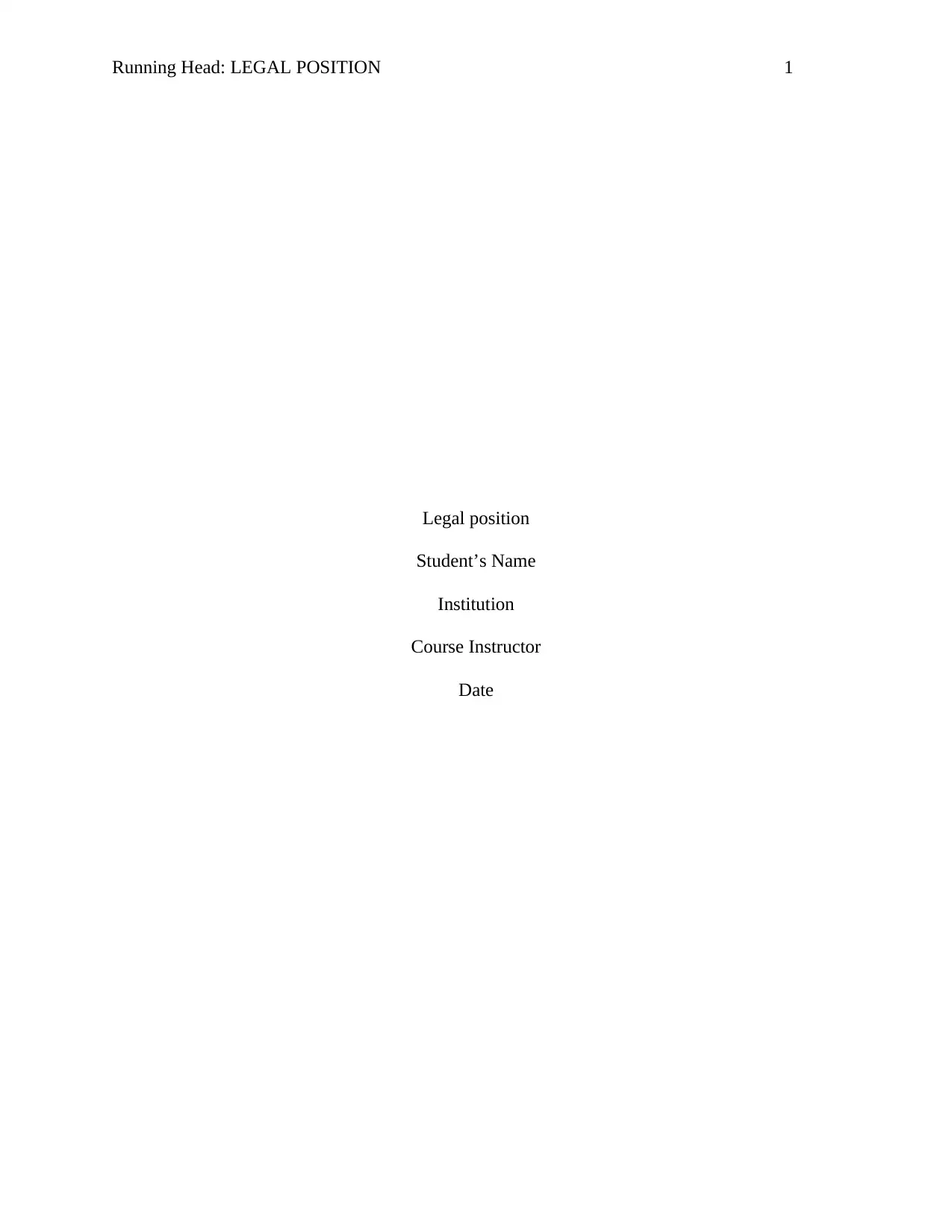
Running Head: LEGAL POSITION 1
Legal position
Student’s Name
Institution
Course Instructor
Date
Legal position
Student’s Name
Institution
Course Instructor
Date
Paraphrase This Document
Need a fresh take? Get an instant paraphrase of this document with our AI Paraphraser
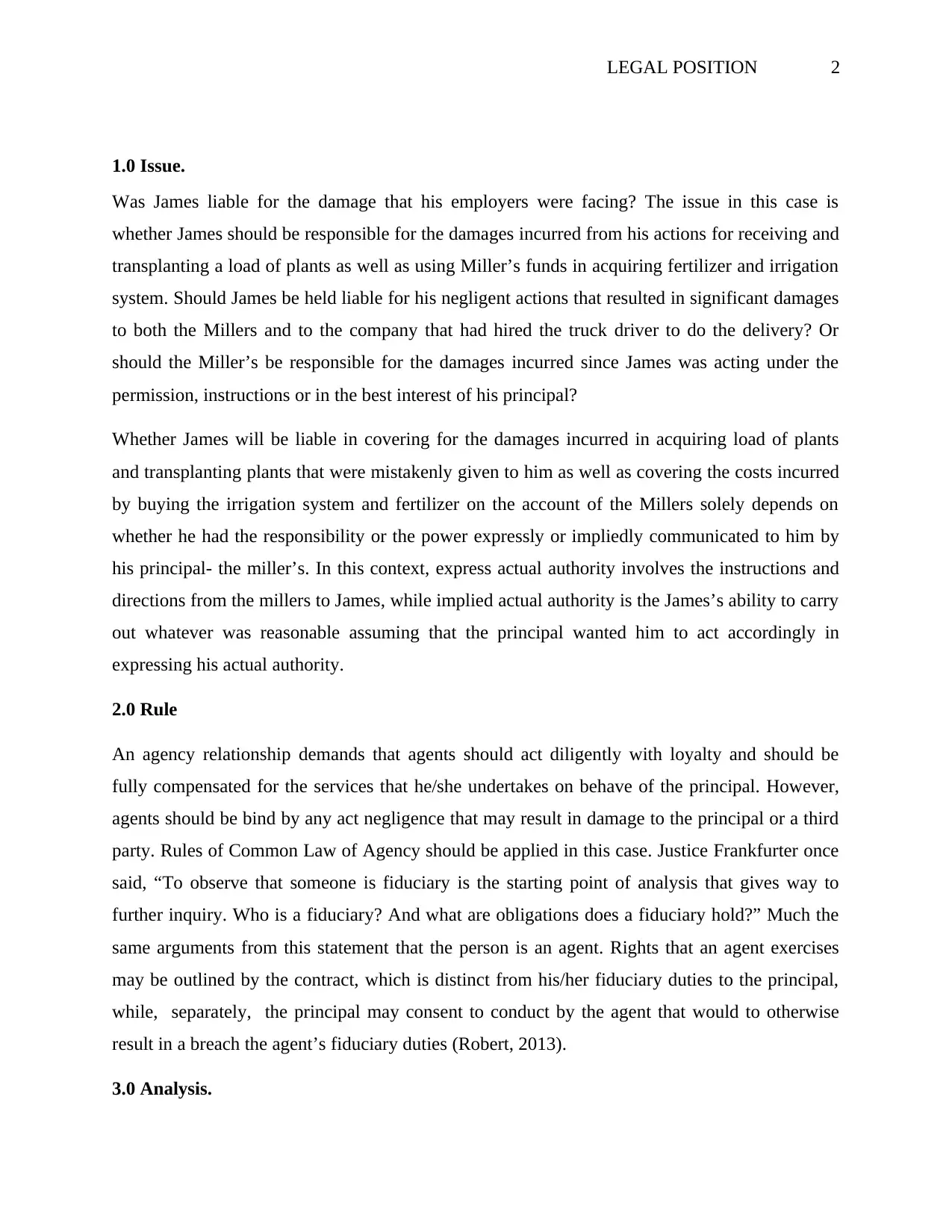
LEGAL POSITION 2
1.0 Issue.
Was James liable for the damage that his employers were facing? The issue in this case is
whether James should be responsible for the damages incurred from his actions for receiving and
transplanting a load of plants as well as using Miller’s funds in acquiring fertilizer and irrigation
system. Should James be held liable for his negligent actions that resulted in significant damages
to both the Millers and to the company that had hired the truck driver to do the delivery? Or
should the Miller’s be responsible for the damages incurred since James was acting under the
permission, instructions or in the best interest of his principal?
Whether James will be liable in covering for the damages incurred in acquiring load of plants
and transplanting plants that were mistakenly given to him as well as covering the costs incurred
by buying the irrigation system and fertilizer on the account of the Millers solely depends on
whether he had the responsibility or the power expressly or impliedly communicated to him by
his principal- the miller’s. In this context, express actual authority involves the instructions and
directions from the millers to James, while implied actual authority is the James’s ability to carry
out whatever was reasonable assuming that the principal wanted him to act accordingly in
expressing his actual authority.
2.0 Rule
An agency relationship demands that agents should act diligently with loyalty and should be
fully compensated for the services that he/she undertakes on behave of the principal. However,
agents should be bind by any act negligence that may result in damage to the principal or a third
party. Rules of Common Law of Agency should be applied in this case. Justice Frankfurter once
said, “To observe that someone is fiduciary is the starting point of analysis that gives way to
further inquiry. Who is a fiduciary? And what are obligations does a fiduciary hold?” Much the
same arguments from this statement that the person is an agent. Rights that an agent exercises
may be outlined by the contract, which is distinct from his/her fiduciary duties to the principal,
while, separately, the principal may consent to conduct by the agent that would to otherwise
result in a breach the agent’s fiduciary duties (Robert, 2013).
3.0 Analysis.
1.0 Issue.
Was James liable for the damage that his employers were facing? The issue in this case is
whether James should be responsible for the damages incurred from his actions for receiving and
transplanting a load of plants as well as using Miller’s funds in acquiring fertilizer and irrigation
system. Should James be held liable for his negligent actions that resulted in significant damages
to both the Millers and to the company that had hired the truck driver to do the delivery? Or
should the Miller’s be responsible for the damages incurred since James was acting under the
permission, instructions or in the best interest of his principal?
Whether James will be liable in covering for the damages incurred in acquiring load of plants
and transplanting plants that were mistakenly given to him as well as covering the costs incurred
by buying the irrigation system and fertilizer on the account of the Millers solely depends on
whether he had the responsibility or the power expressly or impliedly communicated to him by
his principal- the miller’s. In this context, express actual authority involves the instructions and
directions from the millers to James, while implied actual authority is the James’s ability to carry
out whatever was reasonable assuming that the principal wanted him to act accordingly in
expressing his actual authority.
2.0 Rule
An agency relationship demands that agents should act diligently with loyalty and should be
fully compensated for the services that he/she undertakes on behave of the principal. However,
agents should be bind by any act negligence that may result in damage to the principal or a third
party. Rules of Common Law of Agency should be applied in this case. Justice Frankfurter once
said, “To observe that someone is fiduciary is the starting point of analysis that gives way to
further inquiry. Who is a fiduciary? And what are obligations does a fiduciary hold?” Much the
same arguments from this statement that the person is an agent. Rights that an agent exercises
may be outlined by the contract, which is distinct from his/her fiduciary duties to the principal,
while, separately, the principal may consent to conduct by the agent that would to otherwise
result in a breach the agent’s fiduciary duties (Robert, 2013).
3.0 Analysis.
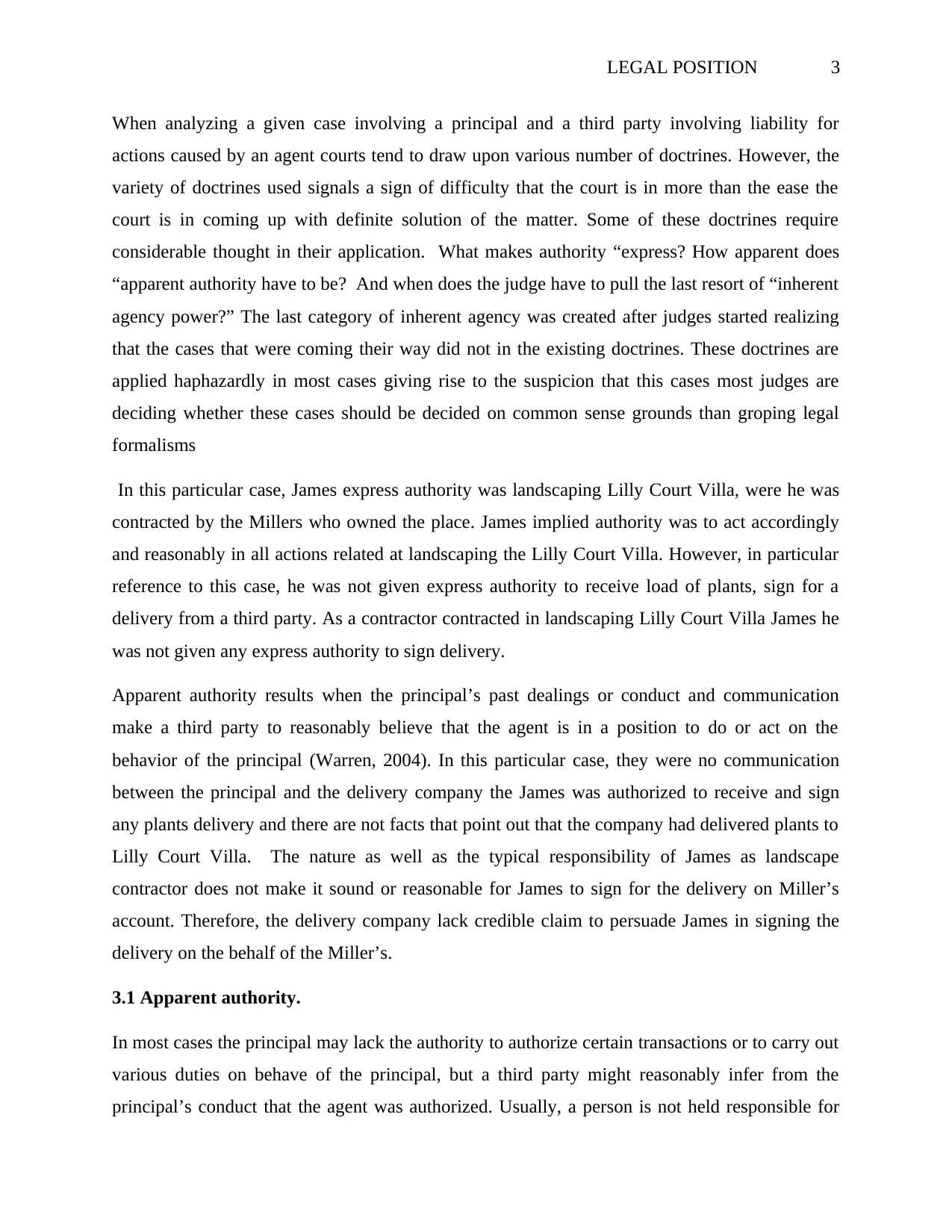
LEGAL POSITION 3
When analyzing a given case involving a principal and a third party involving liability for
actions caused by an agent courts tend to draw upon various number of doctrines. However, the
variety of doctrines used signals a sign of difficulty that the court is in more than the ease the
court is in coming up with definite solution of the matter. Some of these doctrines require
considerable thought in their application. What makes authority “express? How apparent does
“apparent authority have to be? And when does the judge have to pull the last resort of “inherent
agency power?” The last category of inherent agency was created after judges started realizing
that the cases that were coming their way did not in the existing doctrines. These doctrines are
applied haphazardly in most cases giving rise to the suspicion that this cases most judges are
deciding whether these cases should be decided on common sense grounds than groping legal
formalisms
In this particular case, James express authority was landscaping Lilly Court Villa, were he was
contracted by the Millers who owned the place. James implied authority was to act accordingly
and reasonably in all actions related at landscaping the Lilly Court Villa. However, in particular
reference to this case, he was not given express authority to receive load of plants, sign for a
delivery from a third party. As a contractor contracted in landscaping Lilly Court Villa James he
was not given any express authority to sign delivery.
Apparent authority results when the principal’s past dealings or conduct and communication
make a third party to reasonably believe that the agent is in a position to do or act on the
behavior of the principal (Warren, 2004). In this particular case, they were no communication
between the principal and the delivery company the James was authorized to receive and sign
any plants delivery and there are not facts that point out that the company had delivered plants to
Lilly Court Villa. The nature as well as the typical responsibility of James as landscape
contractor does not make it sound or reasonable for James to sign for the delivery on Miller’s
account. Therefore, the delivery company lack credible claim to persuade James in signing the
delivery on the behalf of the Miller’s.
3.1 Apparent authority.
In most cases the principal may lack the authority to authorize certain transactions or to carry out
various duties on behave of the principal, but a third party might reasonably infer from the
principal’s conduct that the agent was authorized. Usually, a person is not held responsible for
When analyzing a given case involving a principal and a third party involving liability for
actions caused by an agent courts tend to draw upon various number of doctrines. However, the
variety of doctrines used signals a sign of difficulty that the court is in more than the ease the
court is in coming up with definite solution of the matter. Some of these doctrines require
considerable thought in their application. What makes authority “express? How apparent does
“apparent authority have to be? And when does the judge have to pull the last resort of “inherent
agency power?” The last category of inherent agency was created after judges started realizing
that the cases that were coming their way did not in the existing doctrines. These doctrines are
applied haphazardly in most cases giving rise to the suspicion that this cases most judges are
deciding whether these cases should be decided on common sense grounds than groping legal
formalisms
In this particular case, James express authority was landscaping Lilly Court Villa, were he was
contracted by the Millers who owned the place. James implied authority was to act accordingly
and reasonably in all actions related at landscaping the Lilly Court Villa. However, in particular
reference to this case, he was not given express authority to receive load of plants, sign for a
delivery from a third party. As a contractor contracted in landscaping Lilly Court Villa James he
was not given any express authority to sign delivery.
Apparent authority results when the principal’s past dealings or conduct and communication
make a third party to reasonably believe that the agent is in a position to do or act on the
behavior of the principal (Warren, 2004). In this particular case, they were no communication
between the principal and the delivery company the James was authorized to receive and sign
any plants delivery and there are not facts that point out that the company had delivered plants to
Lilly Court Villa. The nature as well as the typical responsibility of James as landscape
contractor does not make it sound or reasonable for James to sign for the delivery on Miller’s
account. Therefore, the delivery company lack credible claim to persuade James in signing the
delivery on the behalf of the Miller’s.
3.1 Apparent authority.
In most cases the principal may lack the authority to authorize certain transactions or to carry out
various duties on behave of the principal, but a third party might reasonably infer from the
principal’s conduct that the agent was authorized. Usually, a person is not held responsible for
⊘ This is a preview!⊘
Do you want full access?
Subscribe today to unlock all pages.

Trusted by 1+ million students worldwide
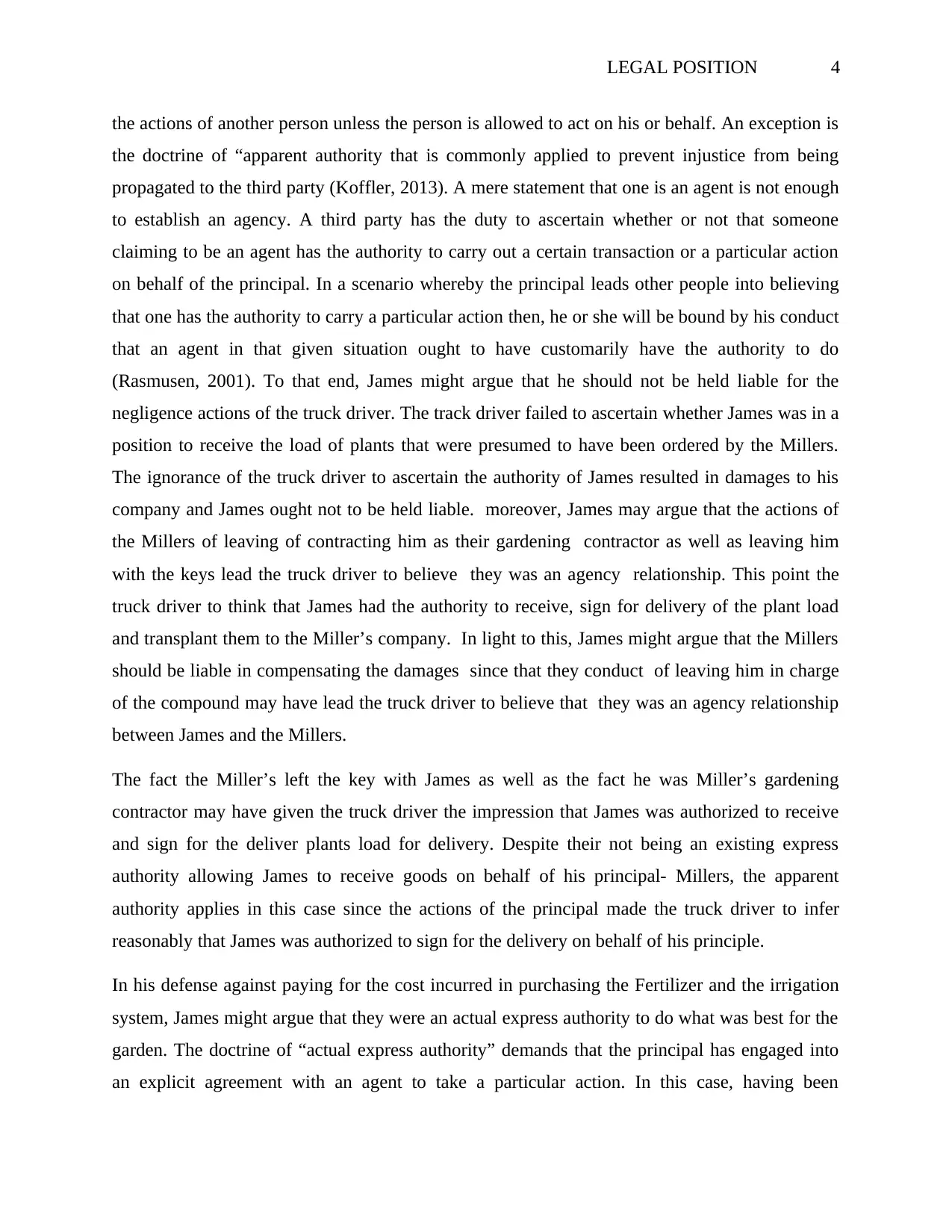
LEGAL POSITION 4
the actions of another person unless the person is allowed to act on his or behalf. An exception is
the doctrine of “apparent authority that is commonly applied to prevent injustice from being
propagated to the third party (Koffler, 2013). A mere statement that one is an agent is not enough
to establish an agency. A third party has the duty to ascertain whether or not that someone
claiming to be an agent has the authority to carry out a certain transaction or a particular action
on behalf of the principal. In a scenario whereby the principal leads other people into believing
that one has the authority to carry a particular action then, he or she will be bound by his conduct
that an agent in that given situation ought to have customarily have the authority to do
(Rasmusen, 2001). To that end, James might argue that he should not be held liable for the
negligence actions of the truck driver. The track driver failed to ascertain whether James was in a
position to receive the load of plants that were presumed to have been ordered by the Millers.
The ignorance of the truck driver to ascertain the authority of James resulted in damages to his
company and James ought not to be held liable. moreover, James may argue that the actions of
the Millers of leaving of contracting him as their gardening contractor as well as leaving him
with the keys lead the truck driver to believe they was an agency relationship. This point the
truck driver to think that James had the authority to receive, sign for delivery of the plant load
and transplant them to the Miller’s company. In light to this, James might argue that the Millers
should be liable in compensating the damages since that they conduct of leaving him in charge
of the compound may have lead the truck driver to believe that they was an agency relationship
between James and the Millers.
The fact the Miller’s left the key with James as well as the fact he was Miller’s gardening
contractor may have given the truck driver the impression that James was authorized to receive
and sign for the deliver plants load for delivery. Despite their not being an existing express
authority allowing James to receive goods on behalf of his principal- Millers, the apparent
authority applies in this case since the actions of the principal made the truck driver to infer
reasonably that James was authorized to sign for the delivery on behalf of his principle.
In his defense against paying for the cost incurred in purchasing the Fertilizer and the irrigation
system, James might argue that they were an actual express authority to do what was best for the
garden. The doctrine of “actual express authority” demands that the principal has engaged into
an explicit agreement with an agent to take a particular action. In this case, having been
the actions of another person unless the person is allowed to act on his or behalf. An exception is
the doctrine of “apparent authority that is commonly applied to prevent injustice from being
propagated to the third party (Koffler, 2013). A mere statement that one is an agent is not enough
to establish an agency. A third party has the duty to ascertain whether or not that someone
claiming to be an agent has the authority to carry out a certain transaction or a particular action
on behalf of the principal. In a scenario whereby the principal leads other people into believing
that one has the authority to carry a particular action then, he or she will be bound by his conduct
that an agent in that given situation ought to have customarily have the authority to do
(Rasmusen, 2001). To that end, James might argue that he should not be held liable for the
negligence actions of the truck driver. The track driver failed to ascertain whether James was in a
position to receive the load of plants that were presumed to have been ordered by the Millers.
The ignorance of the truck driver to ascertain the authority of James resulted in damages to his
company and James ought not to be held liable. moreover, James may argue that the actions of
the Millers of leaving of contracting him as their gardening contractor as well as leaving him
with the keys lead the truck driver to believe they was an agency relationship. This point the
truck driver to think that James had the authority to receive, sign for delivery of the plant load
and transplant them to the Miller’s company. In light to this, James might argue that the Millers
should be liable in compensating the damages since that they conduct of leaving him in charge
of the compound may have lead the truck driver to believe that they was an agency relationship
between James and the Millers.
The fact the Miller’s left the key with James as well as the fact he was Miller’s gardening
contractor may have given the truck driver the impression that James was authorized to receive
and sign for the deliver plants load for delivery. Despite their not being an existing express
authority allowing James to receive goods on behalf of his principal- Millers, the apparent
authority applies in this case since the actions of the principal made the truck driver to infer
reasonably that James was authorized to sign for the delivery on behalf of his principle.
In his defense against paying for the cost incurred in purchasing the Fertilizer and the irrigation
system, James might argue that they were an actual express authority to do what was best for the
garden. The doctrine of “actual express authority” demands that the principal has engaged into
an explicit agreement with an agent to take a particular action. In this case, having been
Paraphrase This Document
Need a fresh take? Get an instant paraphrase of this document with our AI Paraphraser
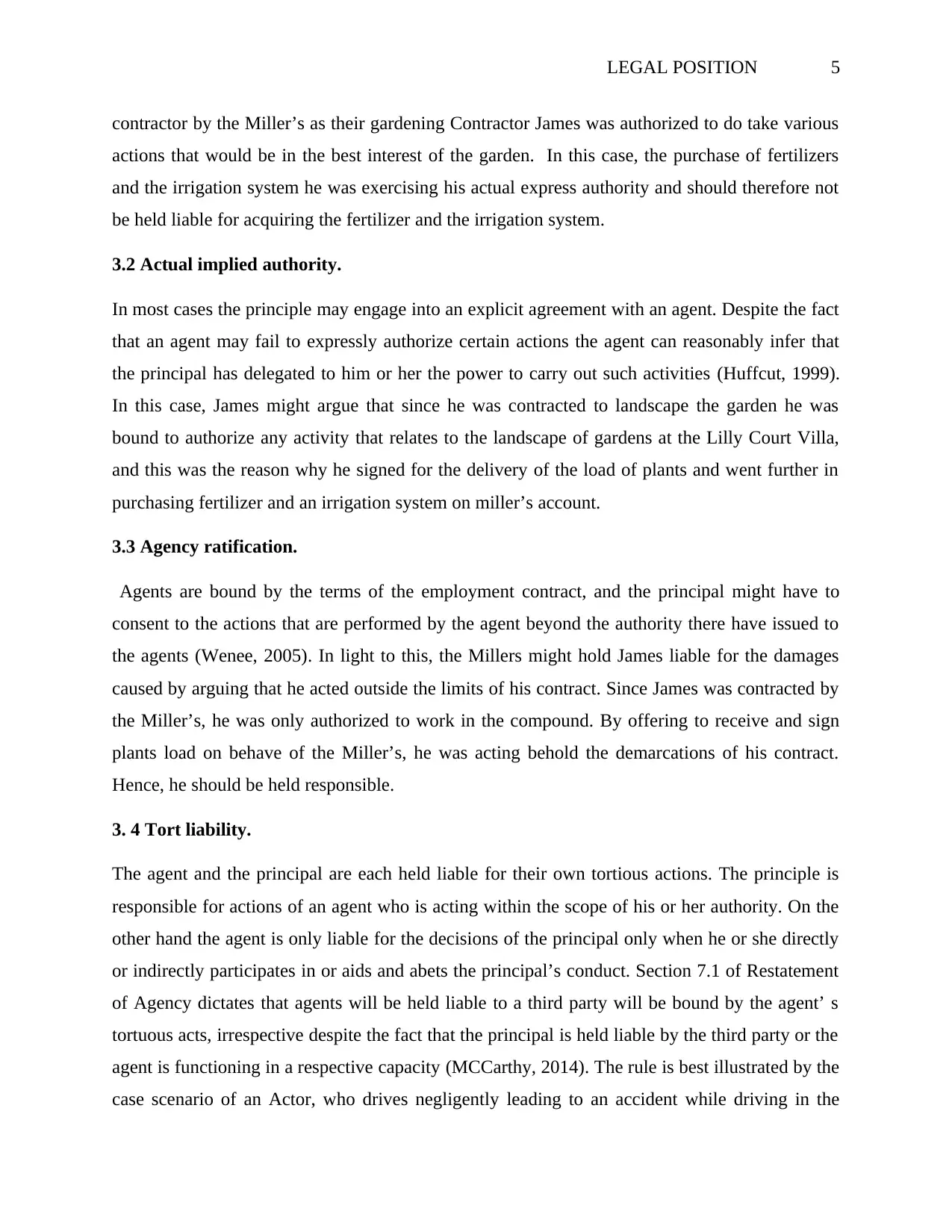
LEGAL POSITION 5
contractor by the Miller’s as their gardening Contractor James was authorized to do take various
actions that would be in the best interest of the garden. In this case, the purchase of fertilizers
and the irrigation system he was exercising his actual express authority and should therefore not
be held liable for acquiring the fertilizer and the irrigation system.
3.2 Actual implied authority.
In most cases the principle may engage into an explicit agreement with an agent. Despite the fact
that an agent may fail to expressly authorize certain actions the agent can reasonably infer that
the principal has delegated to him or her the power to carry out such activities (Huffcut, 1999).
In this case, James might argue that since he was contracted to landscape the garden he was
bound to authorize any activity that relates to the landscape of gardens at the Lilly Court Villa,
and this was the reason why he signed for the delivery of the load of plants and went further in
purchasing fertilizer and an irrigation system on miller’s account.
3.3 Agency ratification.
Agents are bound by the terms of the employment contract, and the principal might have to
consent to the actions that are performed by the agent beyond the authority there have issued to
the agents (Wenee, 2005). In light to this, the Millers might hold James liable for the damages
caused by arguing that he acted outside the limits of his contract. Since James was contracted by
the Miller’s, he was only authorized to work in the compound. By offering to receive and sign
plants load on behave of the Miller’s, he was acting behold the demarcations of his contract.
Hence, he should be held responsible.
3. 4 Tort liability.
The agent and the principal are each held liable for their own tortious actions. The principle is
responsible for actions of an agent who is acting within the scope of his or her authority. On the
other hand the agent is only liable for the decisions of the principal only when he or she directly
or indirectly participates in or aids and abets the principal’s conduct. Section 7.1 of Restatement
of Agency dictates that agents will be held liable to a third party will be bound by the agent’ s
tortuous acts, irrespective despite the fact that the principal is held liable by the third party or the
agent is functioning in a respective capacity (MCCarthy, 2014). The rule is best illustrated by the
case scenario of an Actor, who drives negligently leading to an accident while driving in the
contractor by the Miller’s as their gardening Contractor James was authorized to do take various
actions that would be in the best interest of the garden. In this case, the purchase of fertilizers
and the irrigation system he was exercising his actual express authority and should therefore not
be held liable for acquiring the fertilizer and the irrigation system.
3.2 Actual implied authority.
In most cases the principle may engage into an explicit agreement with an agent. Despite the fact
that an agent may fail to expressly authorize certain actions the agent can reasonably infer that
the principal has delegated to him or her the power to carry out such activities (Huffcut, 1999).
In this case, James might argue that since he was contracted to landscape the garden he was
bound to authorize any activity that relates to the landscape of gardens at the Lilly Court Villa,
and this was the reason why he signed for the delivery of the load of plants and went further in
purchasing fertilizer and an irrigation system on miller’s account.
3.3 Agency ratification.
Agents are bound by the terms of the employment contract, and the principal might have to
consent to the actions that are performed by the agent beyond the authority there have issued to
the agents (Wenee, 2005). In light to this, the Millers might hold James liable for the damages
caused by arguing that he acted outside the limits of his contract. Since James was contracted by
the Miller’s, he was only authorized to work in the compound. By offering to receive and sign
plants load on behave of the Miller’s, he was acting behold the demarcations of his contract.
Hence, he should be held responsible.
3. 4 Tort liability.
The agent and the principal are each held liable for their own tortious actions. The principle is
responsible for actions of an agent who is acting within the scope of his or her authority. On the
other hand the agent is only liable for the decisions of the principal only when he or she directly
or indirectly participates in or aids and abets the principal’s conduct. Section 7.1 of Restatement
of Agency dictates that agents will be held liable to a third party will be bound by the agent’ s
tortuous acts, irrespective despite the fact that the principal is held liable by the third party or the
agent is functioning in a respective capacity (MCCarthy, 2014). The rule is best illustrated by the
case scenario of an Actor, who drives negligently leading to an accident while driving in the
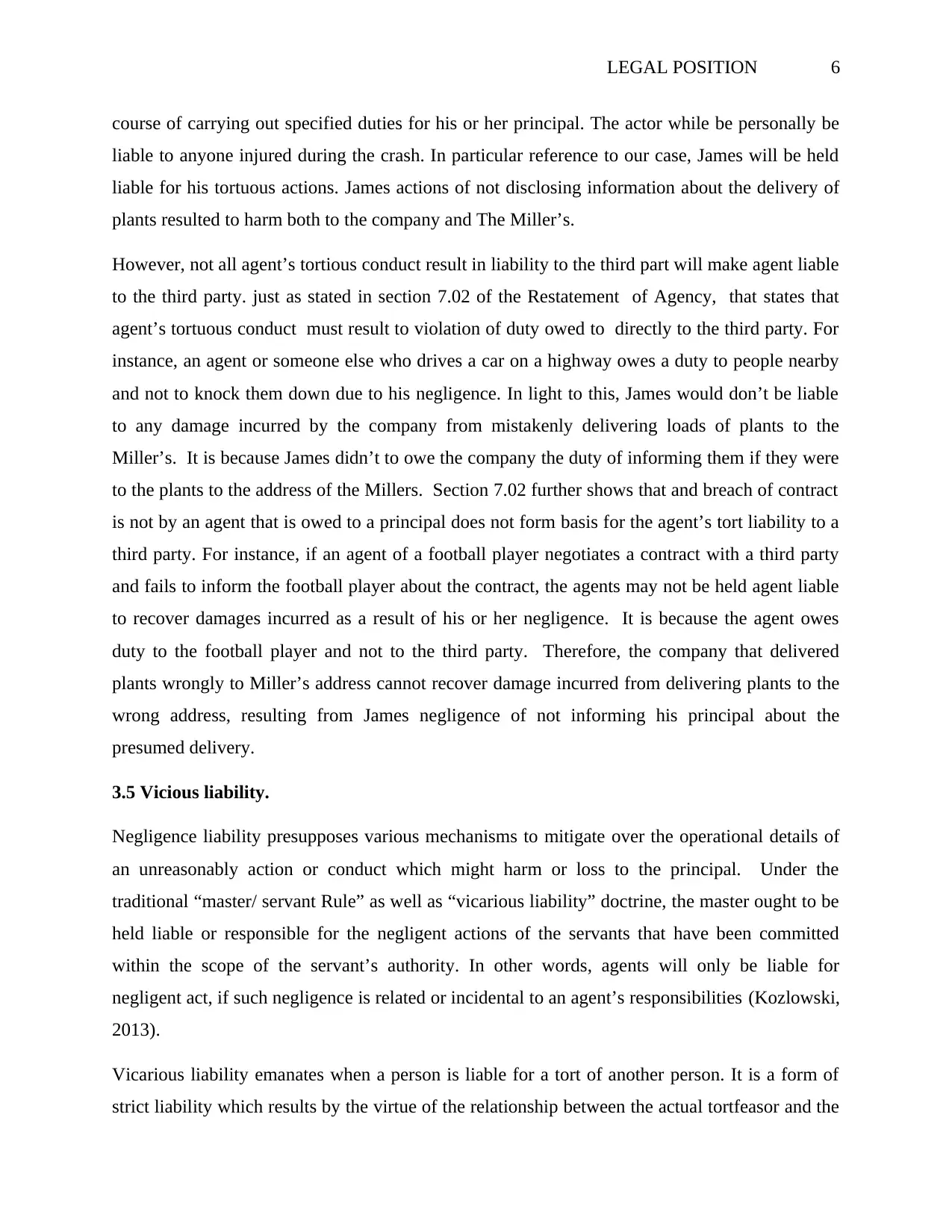
LEGAL POSITION 6
course of carrying out specified duties for his or her principal. The actor while be personally be
liable to anyone injured during the crash. In particular reference to our case, James will be held
liable for his tortuous actions. James actions of not disclosing information about the delivery of
plants resulted to harm both to the company and The Miller’s.
However, not all agent’s tortious conduct result in liability to the third part will make agent liable
to the third party. just as stated in section 7.02 of the Restatement of Agency, that states that
agent’s tortuous conduct must result to violation of duty owed to directly to the third party. For
instance, an agent or someone else who drives a car on a highway owes a duty to people nearby
and not to knock them down due to his negligence. In light to this, James would don’t be liable
to any damage incurred by the company from mistakenly delivering loads of plants to the
Miller’s. It is because James didn’t to owe the company the duty of informing them if they were
to the plants to the address of the Millers. Section 7.02 further shows that and breach of contract
is not by an agent that is owed to a principal does not form basis for the agent’s tort liability to a
third party. For instance, if an agent of a football player negotiates a contract with a third party
and fails to inform the football player about the contract, the agents may not be held agent liable
to recover damages incurred as a result of his or her negligence. It is because the agent owes
duty to the football player and not to the third party. Therefore, the company that delivered
plants wrongly to Miller’s address cannot recover damage incurred from delivering plants to the
wrong address, resulting from James negligence of not informing his principal about the
presumed delivery.
3.5 Vicious liability.
Negligence liability presupposes various mechanisms to mitigate over the operational details of
an unreasonably action or conduct which might harm or loss to the principal. Under the
traditional “master/ servant Rule” as well as “vicarious liability” doctrine, the master ought to be
held liable or responsible for the negligent actions of the servants that have been committed
within the scope of the servant’s authority. In other words, agents will only be liable for
negligent act, if such negligence is related or incidental to an agent’s responsibilities (Kozlowski,
2013).
Vicarious liability emanates when a person is liable for a tort of another person. It is a form of
strict liability which results by the virtue of the relationship between the actual tortfeasor and the
course of carrying out specified duties for his or her principal. The actor while be personally be
liable to anyone injured during the crash. In particular reference to our case, James will be held
liable for his tortuous actions. James actions of not disclosing information about the delivery of
plants resulted to harm both to the company and The Miller’s.
However, not all agent’s tortious conduct result in liability to the third part will make agent liable
to the third party. just as stated in section 7.02 of the Restatement of Agency, that states that
agent’s tortuous conduct must result to violation of duty owed to directly to the third party. For
instance, an agent or someone else who drives a car on a highway owes a duty to people nearby
and not to knock them down due to his negligence. In light to this, James would don’t be liable
to any damage incurred by the company from mistakenly delivering loads of plants to the
Miller’s. It is because James didn’t to owe the company the duty of informing them if they were
to the plants to the address of the Millers. Section 7.02 further shows that and breach of contract
is not by an agent that is owed to a principal does not form basis for the agent’s tort liability to a
third party. For instance, if an agent of a football player negotiates a contract with a third party
and fails to inform the football player about the contract, the agents may not be held agent liable
to recover damages incurred as a result of his or her negligence. It is because the agent owes
duty to the football player and not to the third party. Therefore, the company that delivered
plants wrongly to Miller’s address cannot recover damage incurred from delivering plants to the
wrong address, resulting from James negligence of not informing his principal about the
presumed delivery.
3.5 Vicious liability.
Negligence liability presupposes various mechanisms to mitigate over the operational details of
an unreasonably action or conduct which might harm or loss to the principal. Under the
traditional “master/ servant Rule” as well as “vicarious liability” doctrine, the master ought to be
held liable or responsible for the negligent actions of the servants that have been committed
within the scope of the servant’s authority. In other words, agents will only be liable for
negligent act, if such negligence is related or incidental to an agent’s responsibilities (Kozlowski,
2013).
Vicarious liability emanates when a person is liable for a tort of another person. It is a form of
strict liability which results by the virtue of the relationship between the actual tortfeasor and the
⊘ This is a preview!⊘
Do you want full access?
Subscribe today to unlock all pages.

Trusted by 1+ million students worldwide
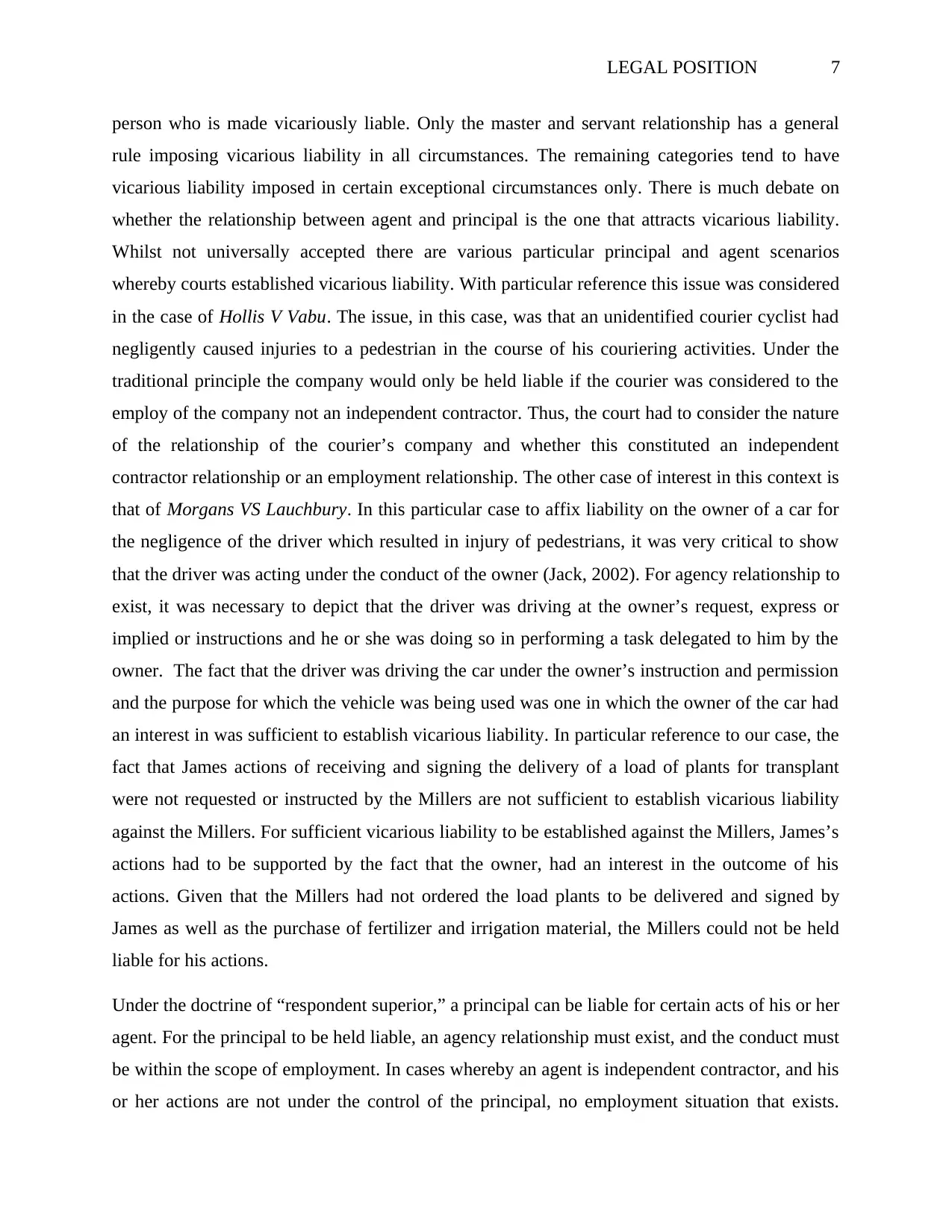
LEGAL POSITION 7
person who is made vicariously liable. Only the master and servant relationship has a general
rule imposing vicarious liability in all circumstances. The remaining categories tend to have
vicarious liability imposed in certain exceptional circumstances only. There is much debate on
whether the relationship between agent and principal is the one that attracts vicarious liability.
Whilst not universally accepted there are various particular principal and agent scenarios
whereby courts established vicarious liability. With particular reference this issue was considered
in the case of Hollis V Vabu. The issue, in this case, was that an unidentified courier cyclist had
negligently caused injuries to a pedestrian in the course of his couriering activities. Under the
traditional principle the company would only be held liable if the courier was considered to the
employ of the company not an independent contractor. Thus, the court had to consider the nature
of the relationship of the courier’s company and whether this constituted an independent
contractor relationship or an employment relationship. The other case of interest in this context is
that of Morgans VS Lauchbury. In this particular case to affix liability on the owner of a car for
the negligence of the driver which resulted in injury of pedestrians, it was very critical to show
that the driver was acting under the conduct of the owner (Jack, 2002). For agency relationship to
exist, it was necessary to depict that the driver was driving at the owner’s request, express or
implied or instructions and he or she was doing so in performing a task delegated to him by the
owner. The fact that the driver was driving the car under the owner’s instruction and permission
and the purpose for which the vehicle was being used was one in which the owner of the car had
an interest in was sufficient to establish vicarious liability. In particular reference to our case, the
fact that James actions of receiving and signing the delivery of a load of plants for transplant
were not requested or instructed by the Millers are not sufficient to establish vicarious liability
against the Millers. For sufficient vicarious liability to be established against the Millers, James’s
actions had to be supported by the fact that the owner, had an interest in the outcome of his
actions. Given that the Millers had not ordered the load plants to be delivered and signed by
James as well as the purchase of fertilizer and irrigation material, the Millers could not be held
liable for his actions.
Under the doctrine of “respondent superior,” a principal can be liable for certain acts of his or her
agent. For the principal to be held liable, an agency relationship must exist, and the conduct must
be within the scope of employment. In cases whereby an agent is independent contractor, and his
or her actions are not under the control of the principal, no employment situation that exists.
person who is made vicariously liable. Only the master and servant relationship has a general
rule imposing vicarious liability in all circumstances. The remaining categories tend to have
vicarious liability imposed in certain exceptional circumstances only. There is much debate on
whether the relationship between agent and principal is the one that attracts vicarious liability.
Whilst not universally accepted there are various particular principal and agent scenarios
whereby courts established vicarious liability. With particular reference this issue was considered
in the case of Hollis V Vabu. The issue, in this case, was that an unidentified courier cyclist had
negligently caused injuries to a pedestrian in the course of his couriering activities. Under the
traditional principle the company would only be held liable if the courier was considered to the
employ of the company not an independent contractor. Thus, the court had to consider the nature
of the relationship of the courier’s company and whether this constituted an independent
contractor relationship or an employment relationship. The other case of interest in this context is
that of Morgans VS Lauchbury. In this particular case to affix liability on the owner of a car for
the negligence of the driver which resulted in injury of pedestrians, it was very critical to show
that the driver was acting under the conduct of the owner (Jack, 2002). For agency relationship to
exist, it was necessary to depict that the driver was driving at the owner’s request, express or
implied or instructions and he or she was doing so in performing a task delegated to him by the
owner. The fact that the driver was driving the car under the owner’s instruction and permission
and the purpose for which the vehicle was being used was one in which the owner of the car had
an interest in was sufficient to establish vicarious liability. In particular reference to our case, the
fact that James actions of receiving and signing the delivery of a load of plants for transplant
were not requested or instructed by the Millers are not sufficient to establish vicarious liability
against the Millers. For sufficient vicarious liability to be established against the Millers, James’s
actions had to be supported by the fact that the owner, had an interest in the outcome of his
actions. Given that the Millers had not ordered the load plants to be delivered and signed by
James as well as the purchase of fertilizer and irrigation material, the Millers could not be held
liable for his actions.
Under the doctrine of “respondent superior,” a principal can be liable for certain acts of his or her
agent. For the principal to be held liable, an agency relationship must exist, and the conduct must
be within the scope of employment. In cases whereby an agent is independent contractor, and his
or her actions are not under the control of the principal, no employment situation that exists.
Paraphrase This Document
Need a fresh take? Get an instant paraphrase of this document with our AI Paraphraser
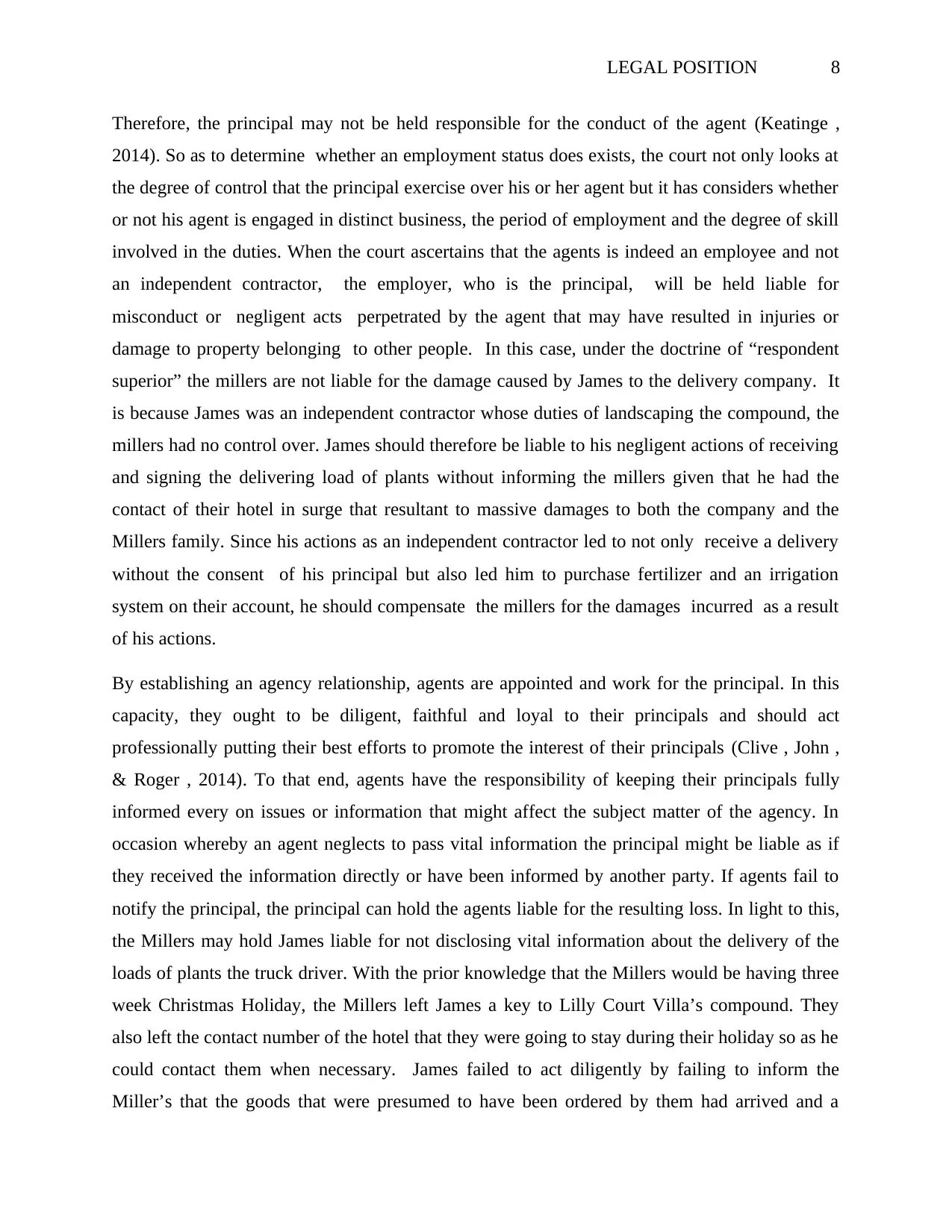
LEGAL POSITION 8
Therefore, the principal may not be held responsible for the conduct of the agent (Keatinge ,
2014). So as to determine whether an employment status does exists, the court not only looks at
the degree of control that the principal exercise over his or her agent but it has considers whether
or not his agent is engaged in distinct business, the period of employment and the degree of skill
involved in the duties. When the court ascertains that the agents is indeed an employee and not
an independent contractor, the employer, who is the principal, will be held liable for
misconduct or negligent acts perpetrated by the agent that may have resulted in injuries or
damage to property belonging to other people. In this case, under the doctrine of “respondent
superior” the millers are not liable for the damage caused by James to the delivery company. It
is because James was an independent contractor whose duties of landscaping the compound, the
millers had no control over. James should therefore be liable to his negligent actions of receiving
and signing the delivering load of plants without informing the millers given that he had the
contact of their hotel in surge that resultant to massive damages to both the company and the
Millers family. Since his actions as an independent contractor led to not only receive a delivery
without the consent of his principal but also led him to purchase fertilizer and an irrigation
system on their account, he should compensate the millers for the damages incurred as a result
of his actions.
By establishing an agency relationship, agents are appointed and work for the principal. In this
capacity, they ought to be diligent, faithful and loyal to their principals and should act
professionally putting their best efforts to promote the interest of their principals (Clive , John ,
& Roger , 2014). To that end, agents have the responsibility of keeping their principals fully
informed every on issues or information that might affect the subject matter of the agency. In
occasion whereby an agent neglects to pass vital information the principal might be liable as if
they received the information directly or have been informed by another party. If agents fail to
notify the principal, the principal can hold the agents liable for the resulting loss. In light to this,
the Millers may hold James liable for not disclosing vital information about the delivery of the
loads of plants the truck driver. With the prior knowledge that the Millers would be having three
week Christmas Holiday, the Millers left James a key to Lilly Court Villa’s compound. They
also left the contact number of the hotel that they were going to stay during their holiday so as he
could contact them when necessary. James failed to act diligently by failing to inform the
Miller’s that the goods that were presumed to have been ordered by them had arrived and a
Therefore, the principal may not be held responsible for the conduct of the agent (Keatinge ,
2014). So as to determine whether an employment status does exists, the court not only looks at
the degree of control that the principal exercise over his or her agent but it has considers whether
or not his agent is engaged in distinct business, the period of employment and the degree of skill
involved in the duties. When the court ascertains that the agents is indeed an employee and not
an independent contractor, the employer, who is the principal, will be held liable for
misconduct or negligent acts perpetrated by the agent that may have resulted in injuries or
damage to property belonging to other people. In this case, under the doctrine of “respondent
superior” the millers are not liable for the damage caused by James to the delivery company. It
is because James was an independent contractor whose duties of landscaping the compound, the
millers had no control over. James should therefore be liable to his negligent actions of receiving
and signing the delivering load of plants without informing the millers given that he had the
contact of their hotel in surge that resultant to massive damages to both the company and the
Millers family. Since his actions as an independent contractor led to not only receive a delivery
without the consent of his principal but also led him to purchase fertilizer and an irrigation
system on their account, he should compensate the millers for the damages incurred as a result
of his actions.
By establishing an agency relationship, agents are appointed and work for the principal. In this
capacity, they ought to be diligent, faithful and loyal to their principals and should act
professionally putting their best efforts to promote the interest of their principals (Clive , John ,
& Roger , 2014). To that end, agents have the responsibility of keeping their principals fully
informed every on issues or information that might affect the subject matter of the agency. In
occasion whereby an agent neglects to pass vital information the principal might be liable as if
they received the information directly or have been informed by another party. If agents fail to
notify the principal, the principal can hold the agents liable for the resulting loss. In light to this,
the Millers may hold James liable for not disclosing vital information about the delivery of the
loads of plants the truck driver. With the prior knowledge that the Millers would be having three
week Christmas Holiday, the Millers left James a key to Lilly Court Villa’s compound. They
also left the contact number of the hotel that they were going to stay during their holiday so as he
could contact them when necessary. James failed to act diligently by failing to inform the
Miller’s that the goods that were presumed to have been ordered by them had arrived and a
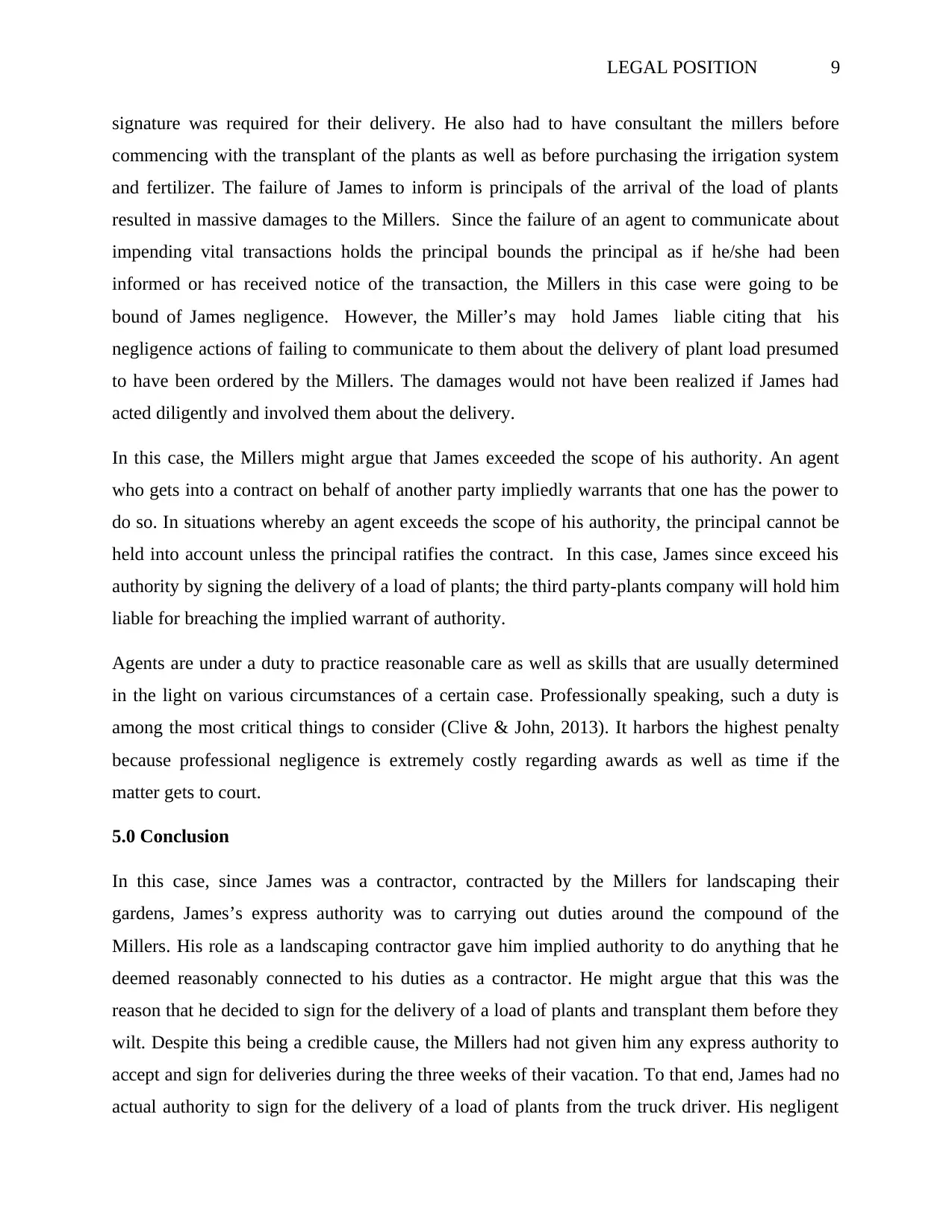
LEGAL POSITION 9
signature was required for their delivery. He also had to have consultant the millers before
commencing with the transplant of the plants as well as before purchasing the irrigation system
and fertilizer. The failure of James to inform is principals of the arrival of the load of plants
resulted in massive damages to the Millers. Since the failure of an agent to communicate about
impending vital transactions holds the principal bounds the principal as if he/she had been
informed or has received notice of the transaction, the Millers in this case were going to be
bound of James negligence. However, the Miller’s may hold James liable citing that his
negligence actions of failing to communicate to them about the delivery of plant load presumed
to have been ordered by the Millers. The damages would not have been realized if James had
acted diligently and involved them about the delivery.
In this case, the Millers might argue that James exceeded the scope of his authority. An agent
who gets into a contract on behalf of another party impliedly warrants that one has the power to
do so. In situations whereby an agent exceeds the scope of his authority, the principal cannot be
held into account unless the principal ratifies the contract. In this case, James since exceed his
authority by signing the delivery of a load of plants; the third party-plants company will hold him
liable for breaching the implied warrant of authority.
Agents are under a duty to practice reasonable care as well as skills that are usually determined
in the light on various circumstances of a certain case. Professionally speaking, such a duty is
among the most critical things to consider (Clive & John, 2013). It harbors the highest penalty
because professional negligence is extremely costly regarding awards as well as time if the
matter gets to court.
5.0 Conclusion
In this case, since James was a contractor, contracted by the Millers for landscaping their
gardens, James’s express authority was to carrying out duties around the compound of the
Millers. His role as a landscaping contractor gave him implied authority to do anything that he
deemed reasonably connected to his duties as a contractor. He might argue that this was the
reason that he decided to sign for the delivery of a load of plants and transplant them before they
wilt. Despite this being a credible cause, the Millers had not given him any express authority to
accept and sign for deliveries during the three weeks of their vacation. To that end, James had no
actual authority to sign for the delivery of a load of plants from the truck driver. His negligent
signature was required for their delivery. He also had to have consultant the millers before
commencing with the transplant of the plants as well as before purchasing the irrigation system
and fertilizer. The failure of James to inform is principals of the arrival of the load of plants
resulted in massive damages to the Millers. Since the failure of an agent to communicate about
impending vital transactions holds the principal bounds the principal as if he/she had been
informed or has received notice of the transaction, the Millers in this case were going to be
bound of James negligence. However, the Miller’s may hold James liable citing that his
negligence actions of failing to communicate to them about the delivery of plant load presumed
to have been ordered by the Millers. The damages would not have been realized if James had
acted diligently and involved them about the delivery.
In this case, the Millers might argue that James exceeded the scope of his authority. An agent
who gets into a contract on behalf of another party impliedly warrants that one has the power to
do so. In situations whereby an agent exceeds the scope of his authority, the principal cannot be
held into account unless the principal ratifies the contract. In this case, James since exceed his
authority by signing the delivery of a load of plants; the third party-plants company will hold him
liable for breaching the implied warrant of authority.
Agents are under a duty to practice reasonable care as well as skills that are usually determined
in the light on various circumstances of a certain case. Professionally speaking, such a duty is
among the most critical things to consider (Clive & John, 2013). It harbors the highest penalty
because professional negligence is extremely costly regarding awards as well as time if the
matter gets to court.
5.0 Conclusion
In this case, since James was a contractor, contracted by the Millers for landscaping their
gardens, James’s express authority was to carrying out duties around the compound of the
Millers. His role as a landscaping contractor gave him implied authority to do anything that he
deemed reasonably connected to his duties as a contractor. He might argue that this was the
reason that he decided to sign for the delivery of a load of plants and transplant them before they
wilt. Despite this being a credible cause, the Millers had not given him any express authority to
accept and sign for deliveries during the three weeks of their vacation. To that end, James had no
actual authority to sign for the delivery of a load of plants from the truck driver. His negligent
⊘ This is a preview!⊘
Do you want full access?
Subscribe today to unlock all pages.

Trusted by 1+ million students worldwide
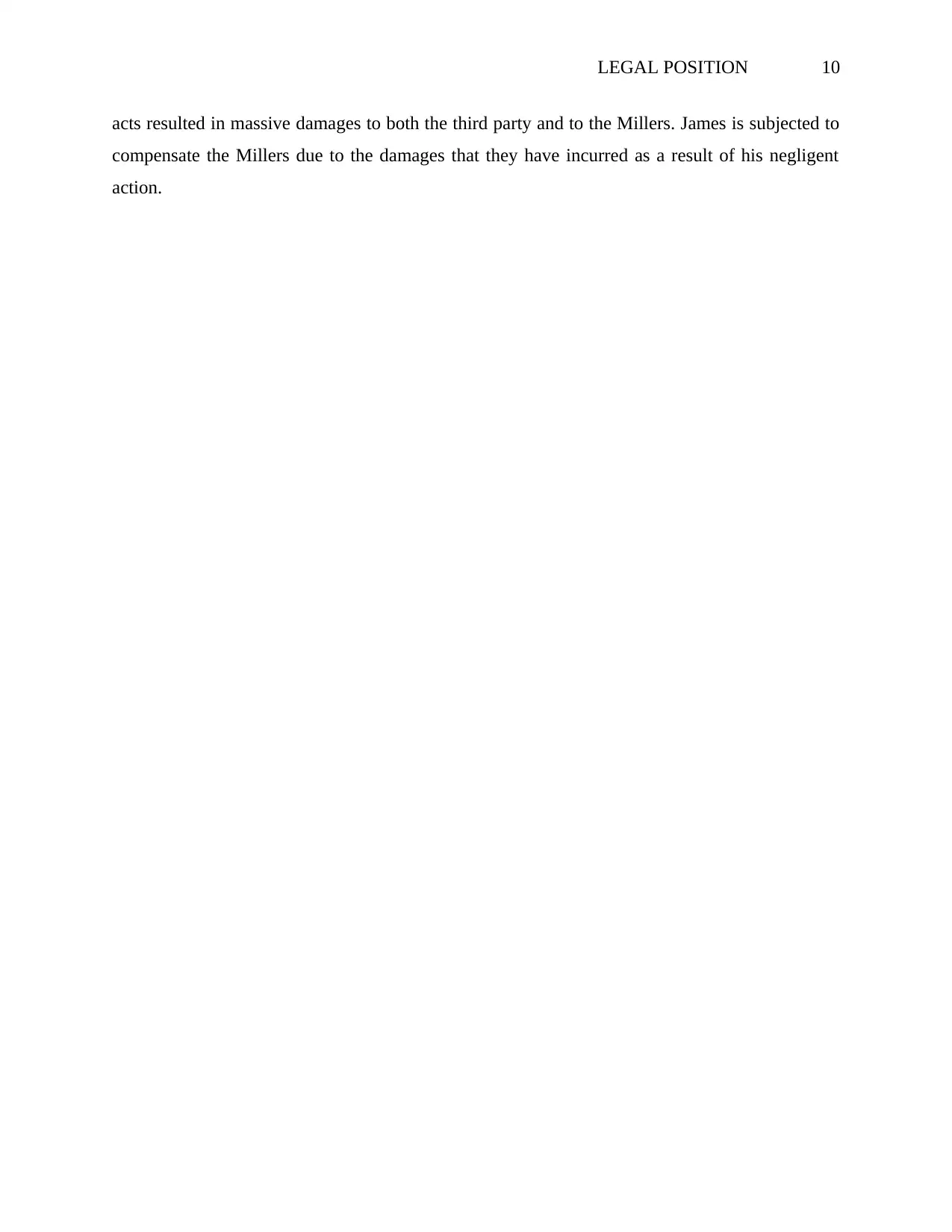
LEGAL POSITION 10
acts resulted in massive damages to both the third party and to the Millers. James is subjected to
compensate the Millers due to the damages that they have incurred as a result of his negligent
action.
acts resulted in massive damages to both the third party and to the Millers. James is subjected to
compensate the Millers due to the damages that they have incurred as a result of his negligent
action.
Paraphrase This Document
Need a fresh take? Get an instant paraphrase of this document with our AI Paraphraser
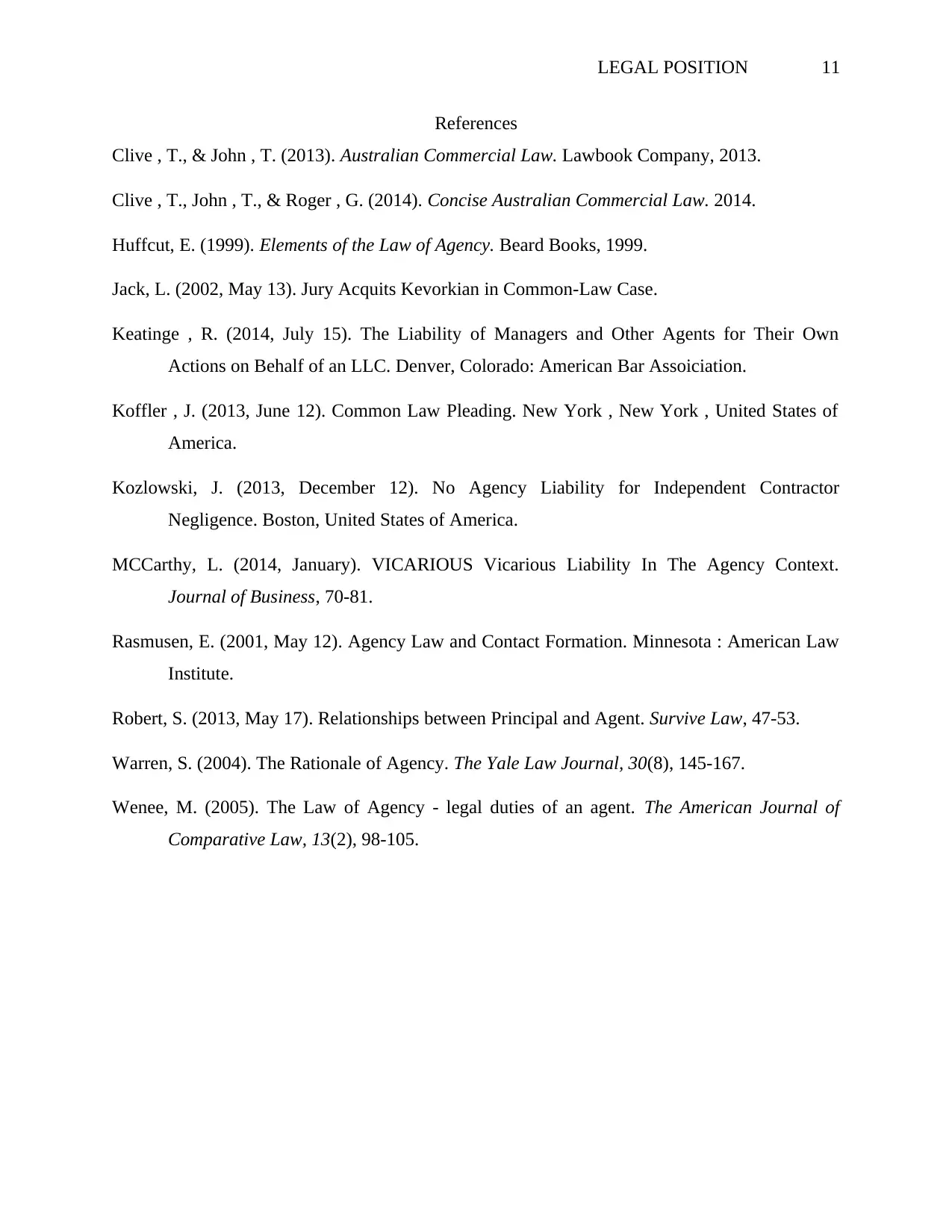
LEGAL POSITION 11
References
Clive , T., & John , T. (2013). Australian Commercial Law. Lawbook Company, 2013.
Clive , T., John , T., & Roger , G. (2014). Concise Australian Commercial Law. 2014.
Huffcut, E. (1999). Elements of the Law of Agency. Beard Books, 1999.
Jack, L. (2002, May 13). Jury Acquits Kevorkian in Common-Law Case.
Keatinge , R. (2014, July 15). The Liability of Managers and Other Agents for Their Own
Actions on Behalf of an LLC. Denver, Colorado: American Bar Assoiciation.
Koffler , J. (2013, June 12). Common Law Pleading. New York , New York , United States of
America.
Kozlowski, J. (2013, December 12). No Agency Liability for Independent Contractor
Negligence. Boston, United States of America.
MCCarthy, L. (2014, January). VICARIOUS Vicarious Liability In The Agency Context.
Journal of Business, 70-81.
Rasmusen, E. (2001, May 12). Agency Law and Contact Formation. Minnesota : American Law
Institute.
Robert, S. (2013, May 17). Relationships between Principal and Agent. Survive Law, 47-53.
Warren, S. (2004). The Rationale of Agency. The Yale Law Journal, 30(8), 145-167.
Wenee, M. (2005). The Law of Agency - legal duties of an agent. The American Journal of
Comparative Law, 13(2), 98-105.
References
Clive , T., & John , T. (2013). Australian Commercial Law. Lawbook Company, 2013.
Clive , T., John , T., & Roger , G. (2014). Concise Australian Commercial Law. 2014.
Huffcut, E. (1999). Elements of the Law of Agency. Beard Books, 1999.
Jack, L. (2002, May 13). Jury Acquits Kevorkian in Common-Law Case.
Keatinge , R. (2014, July 15). The Liability of Managers and Other Agents for Their Own
Actions on Behalf of an LLC. Denver, Colorado: American Bar Assoiciation.
Koffler , J. (2013, June 12). Common Law Pleading. New York , New York , United States of
America.
Kozlowski, J. (2013, December 12). No Agency Liability for Independent Contractor
Negligence. Boston, United States of America.
MCCarthy, L. (2014, January). VICARIOUS Vicarious Liability In The Agency Context.
Journal of Business, 70-81.
Rasmusen, E. (2001, May 12). Agency Law and Contact Formation. Minnesota : American Law
Institute.
Robert, S. (2013, May 17). Relationships between Principal and Agent. Survive Law, 47-53.
Warren, S. (2004). The Rationale of Agency. The Yale Law Journal, 30(8), 145-167.
Wenee, M. (2005). The Law of Agency - legal duties of an agent. The American Journal of
Comparative Law, 13(2), 98-105.
1 out of 11
Related Documents
Your All-in-One AI-Powered Toolkit for Academic Success.
+13062052269
info@desklib.com
Available 24*7 on WhatsApp / Email
![[object Object]](/_next/static/media/star-bottom.7253800d.svg)
Unlock your academic potential
Copyright © 2020–2026 A2Z Services. All Rights Reserved. Developed and managed by ZUCOL.





